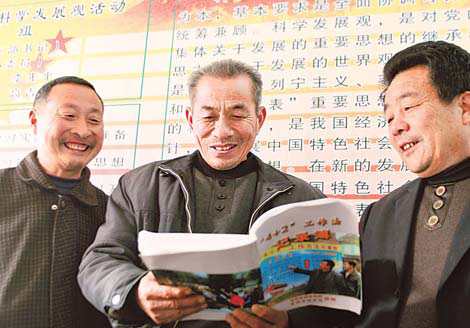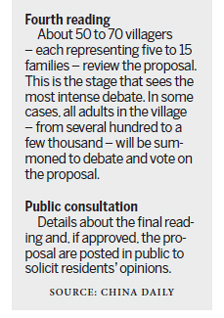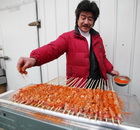Government and Policy
Democracy takes root in rural areas
By Hu Yinan (China Daily)
Updated: 2010-03-02 06:55
 |
Large Medium Small |
The failure to set up clear mechanisms to address the rights of rural constituents after those elections, however, has seriously hampered the government's push for rural autonomy. Many village chiefs have continued to find ways to impose autocratic rule, having won office through bribery or threats, said analysts.
The general offices of the State Council and CPC Central Committee acknowledged the danger of the situation last June in a jointly issued circular that stated: "Village committee elections are not properly conducted in some rural areas, where bribery is grave and seriously harms impartiality."
|
 |
|
Residents of Maying, a village of more than 3,000 people in Henan province, look through a notebook about the rural democratic experiment.[Feng Yongbin/China Daily] |
Candidates running for village heads in richer regions can spend millions on election campaigns, said Li Changping, a former rural official and now a researcher with Hebei University. "There's only one thing that's certain - once they are sworn in, they want plenty more back," he added.
Conflicts between village committees and Party branches have also been a problem. In 2004, the year before the democratic measures were introduced, 15 percent of villages in Dengzhou experienced such conflicts, according to official figures.
Analysts say Liu Chaorui's experiment has resulted in a huge leap forward in rural democracy.
However, real change needs to come from the grassroots cadres, who must understand that they need to negotiate and compromise, not bully and threaten, Liu said.
 |
|
 |
"They must learn that there are procedures and that decisions made through certain procedures are bound to be more democratic than those without them," he told China Daily. "Decisions based on democratic procedures may not always bring the most correct result, but they are definitely always more scientific than those that aren't."
For Liu, ensuring farmers' rights to be informed lies at the heart of his measures.
"This is what Chinese people care about the most. We have to let people know first. Only after people learn what's going on can they truly exercise their right to participate and supervise," he said.
Liu said he believes villagers now have unprecedented rights to veto projects pushed by local leaderships against their interests.
By the end of last year, almost 20 percent of all proposals in Dengzhou were rejected during the reading process, said Zhang Youyin, deputy director of the Organization Department of CPC's Dengzhou Committee.
Zhang, who said he has visited all 579 villages in Dengzhou to monitor the implementation of the measures, insisted that, for now at least, deepening grassroots democracy depends on the competence of township leaders and village Party chiefs.
"The real problems in the Chinese countryside stem from township and village cadres' inability to follow procedures. Without qualified village Party chiefs, the measures cannot be fully promoted," he said.
Village cadres in Taiyuan, capital of Shanxi province, which borders northwest Henan, found it difficult to accept the democratic measures during a training session just before Spring Festival, said Zhang. "Our measures not only curbed their power but also increased their workload."
Ultimately, charismatic grassroots leaders are still needed because, even after 22 years of universal suffrage, most Chinese farmers still do not have mature notions of democracy, said Wang Haizhou, a senior official with Dengzhou's measures implementation office.
"This has helped foster bribery in elections and, in turn, hampered rural democracy. Sometimes, even a pack of cigarettes is enough to buy a rural constituent. Democracy shouldn't be that cheap," he said. "At this point, systematic improvements to assure democracy will have to be implemented through powerful or influential local leaders."
Gao Facang, Party chief for Maying village, is among several officials who have shot to national fame for championing the democratic measures in Dengzhou. He warned that establishing rural autonomy is no easy task.
"The fundamental premise of the measures is that we must work within the framework of the Constitution, meaning we have to make certain 'necessary sacrifices' for the greater good," he said.
In practice, local cadres have used the measures to persuade rural residents to back projects that higher authorities believe will bring long-term benefits.
Although this may go against the immediate interests of local people, Liu said it is already a huge improvement on the days when cadres would blatantly, and often forcefully, push forward their agendas.
"The cadres have to reason with the public even when they are trying to do good," said Liu.
Gao can testify to that, especially following his painstaking efforts to get all 3,229 residents in Maying to donate farmland to give to 1,100 people from Guojiaqu, a village in the neighboring Xichuan county that will be relocated in May as part of the massive South-to-North Water Diversion (SNWD) project.
Tens of thousands of people are to be moved as part of the central government plan to channel water from the Yangtze River to the drought-prone northern provinces. Although the State is building new homes for families in Guojiaqu, those in Maying argue they are the ones losing out.
"We understand the SNWD is a State initiative, but why do we have to make the sacrifice and give away good farmland to these people and work on bad land miles away? I don't get it," said 61-year-old villager Wang Chengjin.
The proposal by the Maying branch of the CPC to allocate farmland for the migrants was defeated by a landslide at three meetings last September. It even suffered an unprecedented rejection at the second reading.







